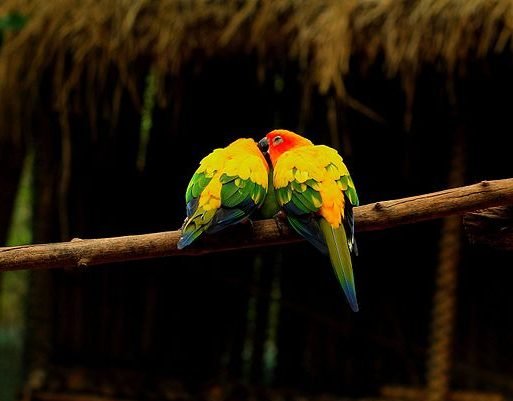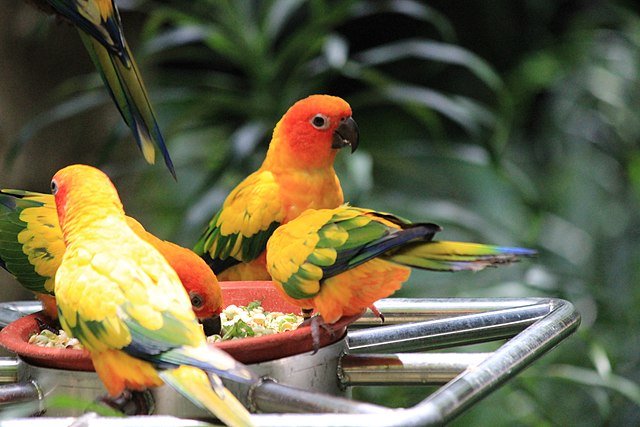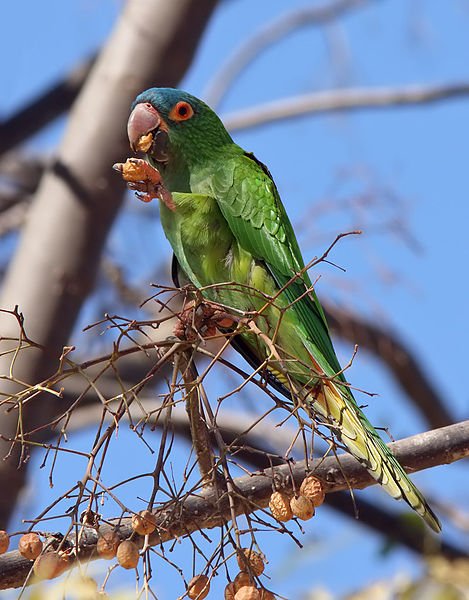The most famous conures; the sun conures also happen to be the most loved pet of the Aratinga genus. A bright yellow plumage, an endearing personality, and an ability to be a loyal companion for a pretty long time; sun conures have earned all the love they are being showered with. And then there is some more to this vividly colored parrot. Starting here right from the basics.
Sun Conure Habitat
Inhabiting mostly the tropical forests, sun conures can be mainly found in the northeastern region of South America. This includes the flooded forests or coastal regions in the south of Guyana, Roraima, southern parts of Suriname and French Guiana, and a few sightings in Venezuela. They love to dwell in the palm trees or any other fruiting plantation.
Sun Conure Color & Markings
Mostly covered in the brightest yellow plumage, sun conures have splashes of orange and green here and there. Where the cheeks and underparts are washed with the orangish tint, the wings are blotched with blue and green. There is a little red around the ears and the characteristic white rings around the eyes. The feet and beak are black. The infants are covered in an olive green plumage and attain their yellow plumage only after their first molt at around 6 months of age.
Sun Conure Lifespan
To know ‘how long can Sun Conures live?’, it is imperative to know the habitat they are put into.
Sun Conure Lifespan in the Wild
The life of a sun conure in the wild is not as easy as that in captivity. With exposure to all the probable dangers from the wild predators, lack of balanced nutrition, and rapid loss of natural habitat, they have a shorter lifespan. They have been documented to live around 10-15 years while in their natural habitat.
Sun Conure Lifespan in Captivity
One of the most common questions about a sun conure is about his lifespan as they are adopted with the thought of having a companion for many years to come. So what is the lifespan of a conure? In captivity, sun conures are known to live for an average of around 20 years. And many have managed to live even for around 3 years if extended exceptional care and utmost devotion.
Sun Conures Talking Ability
When it comes to talking ability, sun conures fall somewhere in the middle of the talking ability scale. They are neither as good as African Greys nor as bad as Caiques. So do sun conures talk? The answer is yes. Sun conures can be taught a few words with extensive practice and the right technique. However, their ability to memorize a large vocabulary is somewhat limited. Also, they are a little quacky and unclear with their speech.
But this doesn’t mean that they have no speech abilities. They are masters at mimicking the sounds they hear everyday around them. Phone ringing, microwave buzzing, dogs barking, or doors creaking; they imitate them almost perfectly rather quickly. And that too without being consciously trained for this.
Sun Conure Training
Like any other pet parrot, training forms an integral part of a sun conure life too, in captivity. They need to be trained for almost everything; from grooming to bathing; eating to playing; they fare well if taught at least a little beforehand. So, the most commonly asked question about their training is: Are Sun Conures easy to train?
And the answer is yes albeit with a condition: train them only with positive reinforcement. Sun conures aren’t known to take well to the scoldings and harsh treatments. The key to a disciplined sun conure is positive reinforcements with lots of rewards at every success and mild ‘ignore’ at every mischief.
Sun Conures Diet
We all, sort of, are aware of the best diet for sun conures. The daily feed includes a small amount of seed mix, fresh fruits and vegetables, a good amount of pellets, and clean freshwater access at all times. But it is the briefing that bothers the conure owners at times. Which fruits and vegetables are apt? What to look for while buying the best pellets? Can their sun have a particular food item? Let’s address the commonest queries about a sun’s diet.
What is conures favorite food?
There are quite a few favorites for a conure when it comes to diet. Here necessities like pellets are not the focus. Just the favorite ones from every food group generally served to them:
Fruits– Sun conures love fresh fruits as it also happens to be their staple diet even in the wild. They have an ingrained affinity for fruits. It is common to serve them with a variety of fruits in captivity. A few good examples would be apples, bananas, grapes, papayas, grapefruits, tomatoes, and all kinds of berries. But banana, apple, melon, and berries are their all-time favorite. Don’t forget to remove the seeds and feed all these just fresh.
Vegetables– Vegetables aren’t readily available in the natural habitat of a sun. If it isn’t about raiding a farmer’s produce in a countryside farm, they rarely feed on them while in jungles. Hence, many conures do not like the naturally bland taste of vegetables. That said they do not create a fuss eating green leafy vegetables like lettuce or spinach as they are just a type of green vegetation as in the wild. As for the rest, slightly sweet vegetables like peas, corn, or boiled sweet potatoes are also among their favorites.
Treats– Just like all other pets, sun conures too love treats. Nuts like walnuts and almonds; seeds like safflower or sunflower; and foods like boiled beans or wheat pasta are a few of their favorites. Do not forget to keep the treats not more than 10% of the total diet.
Can conures eat eggs?
Another most frequently asked question is whether a sun conure can be fed eggs. The answer is yes. But moderation is the key here. Conures aren’t naturally inclined to eat eggs while in the wild. They do have a love for live insects like worms but all of these are sans any fat. And eggs are loaded with quite a fat content which can cause the bird to gain excessive weight and hence, certain diseases like fatty liver, et al. Experts advise serving them scrambled or boiled eggs averaged at around once a month. It is wise to offer these only as special treats meant for special occasions.
Can sun conures eat bananas?
Sun conures love bananas. Contrary to the belief that bananas are poisonous for the little bird, they are a powerhouse for nutrients like iron, magnesium, Vitamin A, B6, C, et al. Sun conures not only enjoy the main fruit but also the peel sometimes. So before serving the fruit, ensure that it is organic, in case the bird likes to eat the peel too.
Though there is no denying the fact that bananas are nutritious for the bird, when compared with the raw green counterpart (plantain), the regular ripe banana has a little low nutrition profile. But whatever version is served to the bird, it must never be cooked or pan-fried in any way as it’ll kill all the nutrients.
More often than not, many owners feed bananas only when their sun has digestive issues as they are great laxatives. That said, bananas can also be used as a treat in the form of banana bread. Do not add salt, sugar, or any oil to it. Just plain banana bread sprinkled with some nuts on the top would win the bird.
More about Conure Diet here:
https://parrotquaker.com/best-food-for-sun-conure/
What is the best conures food?
If it is about serving the conure just with a single food that has an optimum balance of all the nutrients to keep the bird fit and healthy, it is undoubtedly pellets. Pellets, even otherwise too, must form around 70% of the sun’s diet. It has everything that the little bird may not be getting from fruits, vegetables, seeds, or supplements. Hence, it can be termed as a ‘complete food’ for the conure.
Sun Conure Behavior
Before adopting a sun conure, it is imperative to know his behavior beforehand as this one is not a beginner’s bird. So, addressing here on the frequent queries about the sun’s behavior:
Are sun conures noisy?
The honest answer to this question is a big YES. Sun conures are considered one of the noisiest species and hence are never advised for beginners or for those that cannot devote sufficient time to this bird. Apart from the customary contact call at dawn and dusk, they can be pretty loud when overly excited, extremely bored, lonely, or stressed.
Their screams, screeches, and squawks have been recorded at around 120 decibels on the noise scale and it is considered as damaging for the ears. It gets even more unbearable as once it all begins, they tend to be continuous and consistent with it causing pain in the ears. The only way to keep the sun from getting it all started is to spend enough time with him daily to keep him happy and entertained. Also, provide him with enough entertainment ways like toys.
Read more about Sun Conure Behaviour and comparison with other parrots here: https://parrotquaker.com/sun-conure-behavior-and-comparison-with-other-parrots/
Do conures like to cuddle?
Conures are affectionate species and sun conures are no exception. Sun conures love to cuddle with their favorite human. Another common question that is just another version of this one is ‘Do conures like to be held?’. The answer to this question is also a resounding yes. The key is to be gentle while handling them and also offer them plenty of time to form a bond that they feel comfortable to be held. The best way to nail it successfully is to teach them the ‘step-up’ technique. It gets easier from here for them to hop onto your chest to cuddle.
Also, even when alone in the cage, sun conures live to snuggle up to themselves for a cozy feel. For this, it is very common for the sun owners to hang a snug-fit fleece hut inside their cage.
Why do conures puff up?
There are varied reasons for a sun conure being puffed up:
- Puffed up conure while sleeping- A sleeping puffed up conure means that the bird is feeling relaxed and at peace. Another reason is that the sun’s body is regulating the temperature. Hence, there is no reason to worry about the bird that way.
- Puffed up conure while awake- If the sun conure is puffed up during the day, it is time to know where it stems from as the reasons could be plenty. The foremost reason could be that the house is too cold and the bird is trying hard to brave the chill. The next reason could be a desire to mate with his loved companion. And lastly, the most misunderstood reason is either fear of something or aggressive. Many owners confuse both these emotions and hence, fail to solve the issue. The key is to know the bird well based on a strong bond.
How smart is a sun conure?
To judge the smartness of a conure, let’s know his ability to learn speech and mental games. When it comes to vocabulary, almost all the suns can manage to learn an average of 5 to 10 words. Not only this, they can memorize to use them in context too. Next, is the mental ability to nail various games like puzzles, matching the blocks with apt shapes and sizes, et al. Sun conures have been known to successfully do this in just under a few minutes and then ask for some more mental stimulation. Not to forget the ability to learn tricks like waving, mimicking, or shaking hands. Hence, the bottom line is: Sun conures are smart enough to amaze everyone around.
Are sun conures nippy?
Sun conures are naturally inclined to chew on everything they can, just like they do in the wild. And this chewing doesn’t include just the foraging toys. Suns, until taught otherwise, are quite nippy even with their favorite human. And the reason is not always anger. Feelings of super energetic or anxious about the day could also be the reasons among many. And Do sun conure bites hurt?
The answer is yes. He hard and strong beaks of suns are made to tear off the woods in the wild. Hence, their beaks are pretty strong and capable of ripping the skin off too. The best way to avoid such encounters is to train them not to bite early on.
Sun Conure Gender Differences
Sun conures are monomorphic, thus, the distinction between both the sexes can hardly be predicted. Though the keen eyes are known to tell the females apart from their rounder and flatter head, tiny bills, or smaller size, the right way of distinction is by DNA testing only. But what concerns most would-be sun conure owners is deciding which gender bird they should adopt.
More about Gender difference here:
https://parrotquaker.com/sun-conure-gender-difference/

Are male or female conures better?
Though the behavior of every individual sun conure is different depending on the way he/she has been raised before adoption, the consensus is with the female suns being gentler and easier to deal with. They are also reported to be more cuddly contrary to their male counterparts that might have temper issues at times. That said, one can always affect a positive change in behavior by hovering his sun whether male or female, with all the love and affection.
Are sun conures a one-person bird?
Sun conures are big birds in a medium-sized body. They do a lot of playing and chatting all day long to stay entertained and happy. Thus, they need a lot many people around them that can shower them with the required attention. Hence, they are a family bird rather than a one-person bird. But do conures get attached to one person? There is always a possibility of suns getting attached to a single person. A particular sun feeling a natural inclination towards a single person is not uncommon.
Sun Conure Price
Owing to their attractive color and markings, sun conures are a bit pricier when compared to other parrot species.
How much does a sun conure cost?
They can cost you anywhere between $350 to $700 depending on the region, breeder, gender, age, and level of training imparted. For example, it is available for $599 at The Finch Farm and $475 at MD Bird Farm.
Are conures high maintenance?
Conures can be termed as a little high maintenance as they aren’t beginner birds. They demand both time and attention for staying healthy and hearty. Add to it the living costs, especially the larger cage and more toys. But they aren’t as high maintenance as larger birds like African Greys or Macaws.
Summing Up
The most vividly colored conure, the sun, is a perfect mix of both beauty and brains. A beautiful plumage like a summer sun along with the intelligence of communicating with context, the sun conure is a perfect companion bird. And if cared for well, many pet suns have been reported to live for 20 years and even more.
Featured photo Credit:Srimanta Khadanga niku / CC BY-SA





